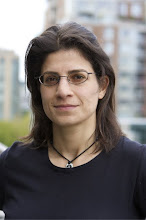Comments on Battleground Schools: "Teaching Mathematics" by Susan Gerofsky
In This paper, Susan gives us a historical perspective on mathematics education ideologies in North America in the 20th century. She discusses how math. education has oscillated between two polarities: "progressive" and "conservative/traditional". She points out three major reform movements in the 1900s, responsible for shifts between the above two ideologies in math. education:
1- The progressive movement for mathematics through activity and inquiry (circa 1910-1940)
2- The New Math reform movement of the 1960's
3- The NTCM (National Teachers Council of Mathematics) "Math Wars," standards-based math. reforms, from the 1990s to the present.
I find it interesting how questions like "why math.?", "how much math.?", and "how to teach math.?", "how to assess mathematical knowledge and understanding', etc., have been debated and revisited throughout the history. Somehow, I would feel with the age of industrialization, and technological advances, it would go without argument that learning mathematics is essential to function in today's society. Perhaps "how much", "when" and "how to teach" math. are relevant questions to be revisited from time to time, especially in this rapidly changing society.
The assumptions and stereotypes associated with math.and mathematicians is somewhat alarming. Presumptions such as "mathematics is hard, cold, distant and inhuman", or that "it is only necessary and appropriate for a small elite to understand mathematics". As someone who pursued a PhD in particle physics, I admit that the subject material becomes more complex and people pursuing a higher level of education in any field become mainly focused on their area of expertise; however, this does not mean high school math. needs to be difficult to understand and that all mathematicians or physicist are nerds. I think the main reason behind peoples' misconceptions about math. is because math. is not taught well in schools. The reasons behind this as Susan points out are a few: teachers who are math-phobic, teachers who learned math. the conservative way, finding teaching math. in any other way than the conservative way not practical or possible, and unqualified teachers.
The fact that there is not separation between the government/politics and education (as elaborated on in this paper) is not news to me since I know first hand how governments' choice in funding certain projects and not others changes as the political parties in power change. I am not surprised to know how the curriculum in schools is also influenced by the above. I think government's involvement in
setting/shaping the curriculum (in any field in schools) is wrong. Focus has to always be on producing informed, independent thinkers with critical problem solving abilities through the education system and constantly coming up with and implementing methods proven to improve students' understanding and comprehension of concepts based on results from research.

No comments:
Post a Comment